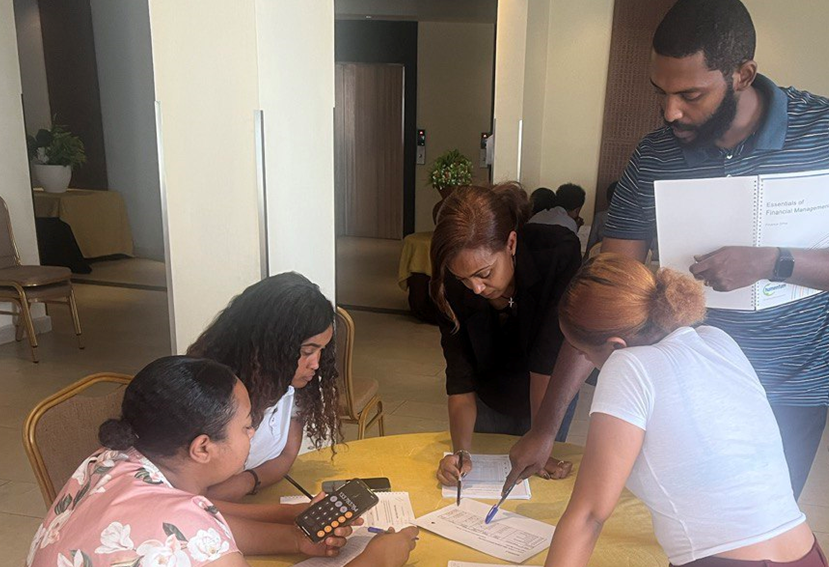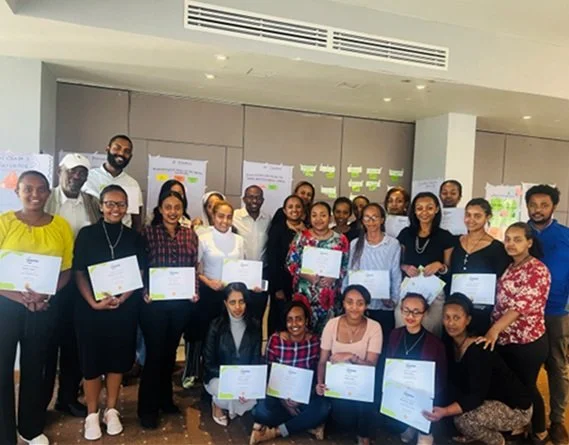Capacity Building Support Enhanced Organisational Systems Enabling Securement of New Funding
The case of Ethiopian Initiative on Human Rights (EIH, Mizan Young Lawyers Centre, and the East African Initiative for Change (I4C)
The Civil Society Innovation Fund (CSIF), financed by the French Development Agency (AFD), has been supporting 15 new and emerging civil society organizations (CSOs) working in Ethiopia over a three-year period (July 2022 – July 2025).
Since most of these CSOs were in the early stages of development at the start of the programme in 2022, they often lacked the resources, systems, and technical skills needed to function effectively. Organisational development support, technical assistance, and targeted trainings have therefore been a key part of CSIF’s strategy.
The Ethiopian Initiative on Human Rights (EIHR) is one of the CSOs that received funding and support through CSIF. At programme start, EIHR lacked qualified staff in key areas, particularly financial management, and did not have a reliable financial system in place—resulting in the organisation being classified as ‘high-risk’ in CSIF’s initial financial risk rating.
Mizan Young Lawyers Centre (MYLC), another programme partner similarly classified as ‘high-risk’, faced challenges in both financial and programme management. The organisation had no structured documentation of transactions or adequate procurement and financial procedures in place.
The East African Initiative for Change (I4C), a CSO established in 2020, also entered the CSIF programme under the CARD-led consortium. Having only been in existence for one year, I4C faced comparable capacity gaps, particularly in project management and financial oversight.
Based on individual capacity assessments, CSIF co-developed tailored action plans with each organisation. EIHR and MYLC both received a three-day financial management training, along with financial planning tools and templates. They were also introduced to Peachtree accounting software. To support implementation, the CSIF Programme Management Consultant (PMC) provided continuous hands-on mentoring, complemented by additional training in project cycle management and proposal writing.
I4C likewise received tailored support, including training and mentoring in financial management, communication, and programme implementation. Terfenesh Degefu, Head of Finance at I4C, reflected: “We now have reliable financial management practices because of the CSIF support. Additionally, our portfolio is drawing in more finance and improving our standing in the market.” She added, “As we interact with other CSOs both inside and outside of our consortium, our network has also expanded. Thanks to CSIF, we will undoubtedly be able to obtain additional funding in the future as well.”
As a result of this support, all three organisations have established stronger financial systems, enabling them to generate accurate reports, monitor budgets effectively, and strengthen coordination between finance and programme teams. These internal improvements have also helped them secure new funding from external donors.
Ato Tenna, EIHR's Project Coordinator, reports that in 2024 the organisation secured an estimated six million Ethiopian Birr (around US$ 42,000) from Freedom House and a Scandinavian donor. These funds supported a situational analysis of CSOs in Burayu and a study on gender-based violence in Internally Displaced Persons centres in Oromia, Somali, and Tigray regions.
Images from the Financial Management Training, hosted January 2023.
Similarly, MYLC received an estimated US$ 20,000 in funding from the Strategic Initiative for Women in the Horn of Africa (SIHA) and the Consortium of Christian Relief and Development Association (CCRDA), supporting gender-responsive justice training and organisational development.
I4C’s strengthened capacity also enabled it to secure over 35 million Ethiopian Birr (approximately US$ 250,000) from donors such as the Centre for Humanitarian Dialogue, Life and Peace Institute, USAID, Conciliation Resources, and the Embassy of Switzerland. These funds have supported I4C’s intercommunity and strategic dialogue work, Disarmament, Demobilisation, and Reintegration (DDR) efforts in Oromia, and engagement with Ethiopia’s National Dialogue Commission.
Gutema Brehanu, Project Manager at I4C, noted: “Even though my professional background is in Law, because of the exposure I got in this project and the trainings I have received, I feel that I have obtained expert level knowledge in project management particularly on issues of peace building.” He added, “Without such an endeavour that has built our visibility from scratch … who will trust us? No one! We have no support from any other project like CSIF.”
MYLC’s and EIHR's transition from informal systems to best practice in financial management stands as a testament to the value of targeted capacity-building interventions. According to the Executive Director of MYLC, Ato Amanuel Dibabe: “…the skills and expertise of the personnel have been much improved by this [CSIF] intervention, giving them the tools they need to handle projects successfully. This has made it possible to record daily transactions and produce accurate financial reports on time. Thanks to CSIF’s specific capacity building methodologies, emerging CSOs can execute projects successfully and ....exhibit significant activities. And this is a model worth imitating.”
Together, these stories show how sustained and context-specific capacity support has enabled new and emerging CSOs to not only build internal systems but also position themselves as credible actors capable of attracting and managing larger funding portfolios.
Participants of the Financial Management Training, hosted January 2023.



